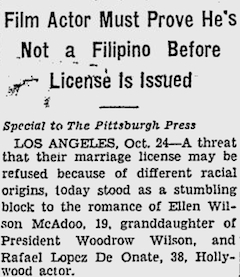 There is an interracial romance at the heart of my next book, so I’ve spent appreciable time researching the question of how such couples were regarded in the early 1970s. As is typically the case, that line of inquiry has piqued my interest in a tangential matter: the creation of anti-miscegenation laws specifically targeted at Filipinos. Much to my surprise, some of the nation’s more traditionally open-minded states enacted such laws in the early part of the 20th century. California is one prime example; after a 1930 court case found that the states anti-miscegenation laws did not specifically bar couplings of Filipinos and whites, the legislature acted with extreme alacrity to correct that “oversight.” The result was stories like the one cited in the newspaper clipping above, in which Filipinos were compelled to prove that they lacked “Malay blood” before obtaining marriage certificates.
There is an interracial romance at the heart of my next book, so I’ve spent appreciable time researching the question of how such couples were regarded in the early 1970s. As is typically the case, that line of inquiry has piqued my interest in a tangential matter: the creation of anti-miscegenation laws specifically targeted at Filipinos. Much to my surprise, some of the nation’s more traditionally open-minded states enacted such laws in the early part of the 20th century. California is one prime example; after a 1930 court case found that the states anti-miscegenation laws did not specifically bar couplings of Filipinos and whites, the legislature acted with extreme alacrity to correct that “oversight.” The result was stories like the one cited in the newspaper clipping above, in which Filipinos were compelled to prove that they lacked “Malay blood” before obtaining marriage certificates.
One state that resisted the trend was Washington, where Filipino anti-miscegenation laws were defeated in both 1935 and 1937. In the latter instance, opponents rallied around an op-ed that focused primarily on the fallacious science of the fearful:
In March of 1937, the Philippine Advocate published an article by Catelino Viado, a Filipino author, claiming that there was “no race deterioration in mixed marriages.” Here, the argument was based not only on American ideals but on the fallacy of racist pseudoscience in claiming that intermarriage would produce “race deterioration.” In making his point, Viado used the example of plant and animal hybridization to produce superior natural products, arguing that the notion of “race deterioration” from mixed marriages was a product of “petty jealousy and race sentimentalism” and could potentially improve the human race.
I like how Viado turned the common pseudoscientific argument on its head, in a manner that probably never occurred to people who benefitted from hybridization in their daily lives. Makes me wonder how much more harmonious a world we could live in if scientific literacy were ratcheted up a mere notch or two. There is a certain amount of wisdom and perspective that comes from understanding our relative lack of uniqueness in the grand scheme of life.


eve // Nov 21, 2011 at 11:44 am
Since you posted General Election the other day, I’m sure you know this one too. But just in case http://www.youtube.com/watch?v=6AezDEA8ktA
Brendan I. Koerner // Nov 21, 2011 at 1:07 pm
@eve: Heh, thank you–wasn’t familiar with that one at all. My knowledge of Lord Beginner remains beginner-level at this point–first got exposed to him last week via the magic of Radio Nova. Something so cool about hearing those hot-button political topics discussed in that pleasing calypso lilt.
scottstev // Nov 21, 2011 at 1:21 pm
Alas, pseudo-scientific thought will always be with us. Our biases and love a narrative arc create too many opportunities to justify our most base behaviors.
Currently, I’m fascinated by the more “scientific” proponents of “Game,” where a bunch of cherry-picked news releases of psychological studies of unknown rigor are listed as proof that all the girls really want is for you to behave like an asshole.
Like the old medical-school saw goes, half of our presumed scientific knowledge is absolutely bogus. We just can’t tell which half.
Brendan I. Koerner // Nov 21, 2011 at 6:47 pm
@scottstev: Agreed, alas. So much for my morning optimism…
Sara Mayeux // Nov 21, 2011 at 9:13 pm
If you haven’t come across it yet, Peggy Pascoe’s book “What Comes Naturally” is a fabulous history of anti-miscegenation laws.
Jordan // Nov 21, 2011 at 10:42 pm
This came up in Jeff Berry’s “Sippin’ Safari”. Don the Beachcomber hired a lot of Filipinos at his early bars. One of them, Dick Santiago, wanted to marry a white woman named Patricia Ridge around 1948. Thankfully Donn was a nice guy and had Dick transferred to his bar in Hawaii, where there weren’t anti-miscegination laws.
scottstev // Nov 22, 2011 at 8:40 am
The other thing to note is, the very wrong-headed thinking is responsible for the tragedy of “purebred” dogs that look quite vigorous but are as genetically frail as any late-reign Romanov.
Brendan I. Koerner // Nov 22, 2011 at 9:40 am
@Sara Mayeux: Thanks for the rec. I just looked up that book, and was pleased to see that Pascoe seemed to specialize in Pacific Northwest history. One of my book’s main characters was from Oregon, so I need to learn more about the region’s attitudes toward miscegenation in the ’50s and ’60s. Will def. add it to my “to-read” queue.
@scottstev: Ta-Nehisi and I were recently talking about that issue. It’s the perfect explanation for why monarchy doesn’t work.